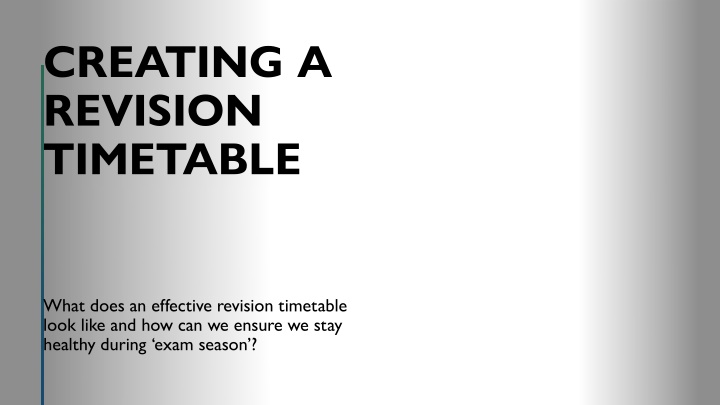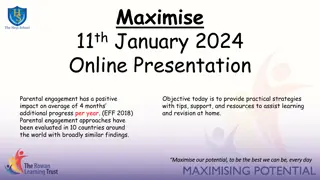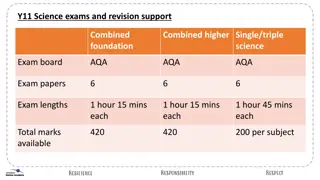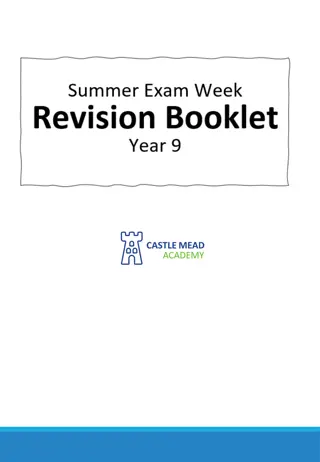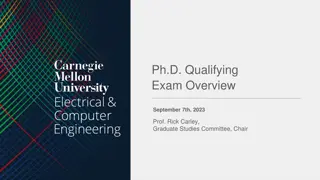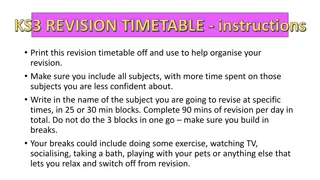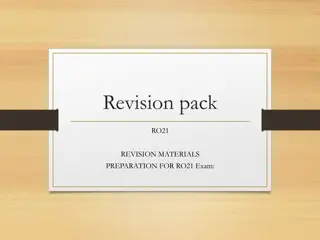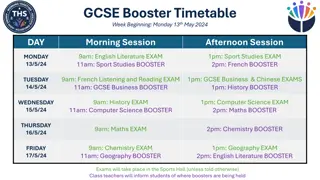Effective Revision Timetable and Healthy Exam Season Habits
Learn about creating an effective revision timetable with principles like schema, interleaving, spacing, and metacognition. Stay healthy during exam season by incorporating breaks, physical activity, nutritious meals, and sufficient sleep. Avoid unproductive revision methods like repeated answering of exam questions.
Download Presentation

Please find below an Image/Link to download the presentation.
The content on the website is provided AS IS for your information and personal use only. It may not be sold, licensed, or shared on other websites without obtaining consent from the author.If you encounter any issues during the download, it is possible that the publisher has removed the file from their server.
You are allowed to download the files provided on this website for personal or commercial use, subject to the condition that they are used lawfully. All files are the property of their respective owners.
The content on the website is provided AS IS for your information and personal use only. It may not be sold, licensed, or shared on other websites without obtaining consent from the author.
E N D
Presentation Transcript
CREATING A REVISION TIMETABLE What does an effective revision timetable look like and how can we ensure we stay healthy during exam season ?
Brain Dump! Brain Dump! Instead of a Memory Platform, today you will do a Brain Dump challenge! 1. Close your books 2. In a timed-pair-share with your partner, explain everything you can remember about learning and revision. 3. Following your discussion, write down everything you both remembered in the back of your books.
Why is repeatedly answering exam questions not an effective way to revise? You are unlikely to make any gains as there is no reflection on what you have done well and improvements needed. This approach to revision can be damaging as you could repeat the same mistakes, making them habit remember practice makes permanent; only perfect practice makes perfect!
Principles of an effective revision timetable Things we might take into consideration when designing our revision timetable: 1. Schema: making links in our learning e.g. revising a theme across texts in literature, revising tyrants from different time periods in history, revising use of BIDMAS in different mathematical questions or papers. 2. Interleaving: alternating between different topics and/or subject areas. 3. Spacing: returning to topics after a break. 4. Metacognition: looking back at areas of weakness from previous study sessions and ensuring we repeatedly return to these, making them the focus of future sessions.
Possible Revision Timetable for English Monday One hour Tuesday Break day Wednesday One hour Thursday Break day Friday One hour Saturday One hour Sunday Break day Revise theme of power in: Revise terminology for structure question (10 mins) Revise theme of power in: Revise theme of guilt in: Revise Dickens structural choices in stave one of A Christmas Carol (20 mins) Macbeth, (20 mins) An Inspector Calls (20 mins) Macbeth, (20 mins) Ozymandias & My Last Duchess poems (20 mins) Kamikaze & Remains poems (20 mins) A Christmas Carol (20 mins) Revise Priestley s use of cliffhangers in An Inspector Calls (15 mins) Make connections between presentation of power in above texts (15 mins) Make connections between presentation of guilt in above texts (15 mins) Make connections between presentation of power in above texts (15 mins) Answer a structure question (10 mins) Make a note of successes and areas to develop from today s study session (5 minutes) Make a note of successes and areas to develop from today s study session (5 minutes) Make a note of successes and areas to develop from today s study session (5 minutes) Make a note of successes and areas to develop from today s study session (5 minutes)
What might an individual study session look like? 5 minutes using Leitner Method flashcards to revise key vocabulary and plot linked to the theme of power in Macbeth. 5 minutes of self-quizzing & self-explaining using Cornell Notes on the theme of power in Macbeth. Make a note of any details I struggled to remember or explain. 10 minutes using the knowledge retrieved to craft a beautiful paragraph exploring power in Macbeth. Use proof-reading key to check and improve sentences where necessary using ideas for upgrading sentences and transition words & phrases. 5 minute Brain Dump/Knowledge Splat on presentation of power in Ozymandias and My Last Duchess including key quotes. Check answers against class notes and make a note of anything I struggled to remember or explain. 15 minutes using knowledge retrieved to craft a beautiful paragraph comparing the poems presentation of power. Use proof-reading key to check and improve sentences where necessary using ideas for upgrading sentences and transition words & phrases. 5 minutes trying to retrieve knowledge from Macbeth & the poems that I struggled to remember or explain. 10 minutes mapping connections in presentation of power in all three texts using a Venn Diagram. 5 minutes making a note of successes and areas to develop from today s study session. Use abbreviations (note-form) where appropriate. Monday One hour Revise theme of power in: Macbeth, (20 mins) Ozymandias & My Last Duchess poems (20 mins) Make connections between presentation of power in above texts (20 mins)
Use the template to create a revision timetable for a subject of your choice. Things we might take into consideration when designing our revision timetable: 1. Schema: making links in our learning e.g. revising a theme across texts in literature, revising tyrants from different time periods in history, revising use of BIDMAS in different mathematical questions or papers. 2. Interleaving: alternating between different topics and/or subject areas. 3. Spacing: returning to topics after a break. 4. Metacognition: looking back at areas of weakness from previous study sessions and ensuring we repeatedly return to these, making them the focus of future sessions.
Revision Timetable Template Monday Tuesday Break day Wednesday Thursday Break day Friday Saturday Sunday Break day Monday Tuesday Wednesday Thursday Friday Saturday Sunday
Now plan what an individual study session will look like Things to consider: What retrieval activities will you include? Flashcards? Brain Dump/Knowledge Splat? Some self-quizzing and self-explaining using elaborative interrogation? Teaching? Retrieve-taking? How will you apply the knowledge retrieved? Through a piece of writing and/or exam answer? Set aside time at the end (and throughout) to make a note of strengths and targets from your study session. How will you make gains in your next study session?
Wellbeing: things to remember 1. Eat: it is very tempting to have sugary snacks and energy drinks to help you through exam season (believe me, I know!) but it is incredibly important we look after our diets. Fruit and vegetables are obviously important and this can be as simple as replacing a fizzy drink with a glass of fruit juice. Sleep: do not fall into the trap of cramming by staying up late the night before an exam. This will only make you feel tired. A good night s sleep is important for your brain and body to feel rested and on top form. Exercise: some fresh air and exercise will help de-stress during the exam period. You could even plan short runs or scenic walks into your revision timetable. Relaxation: taking time to relax is just as important as time spent studying. This might be a long bath, watching your favourite TV programme, reading a book or practising some meditation. Even a minute of mindfulness (closing your eyes and focusing on your breathing) can help to declutter our minds. 2. 3. 4.
